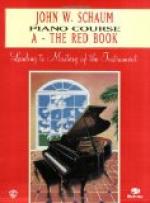“Yes, I have numbers of pupils among society people; girls who go out a good deal and yet find time to practise a couple hours a day. The present tendency of the wealthy is to take a far more serious view of music study than was formerly the case. They feel its uplifting and ennobling influence, respect its teachers, and endeavor to do carefully and well whatever they attempt.
“While necessary and important, the technical foundation is after all but a small part compared to the training for rhythmic sense, and for the knowledge of how to produce good and beautiful results in musical interpretation.”
XXVI
EUGENE HEFFLEY
MODERN TENDENCIES IN PIANO MUSIC
Eugene Heffley, the Founder and first President of the MacDowell Club, of New York, a pianist and teacher of high ideals and most serious aims, came to New York from Pittsburg, in 1900, at the suggestion of MacDowell himself. He came to make a place for himself in the profession of the metropolis, and has proved himself a thoroughly sincere and devoted teacher, as well as a most inspiring master; he has trained numerous young artists who are winning success as pianists and teachers.
Mr. Heffley, while entertaining reverence for the older masters, is very progressive, always on the alert to discover a new trend of thought, a new composer, a new gospel in musical art. He did much to make known and arouse enthusiasm for MacDowell’s compositions, when they were as yet almost unheard of in America. In an equally broad spirit does he introduce to his students the works of the ultra modern school, Debussy, Rachmaninoff, Florent Schmitt, Reger, Liadow, Poldini and others.
“My students like to learn these new things, and the audiences that gather here in the studio for our recitals, come with the expectation of being enlightened in regard to new and seldom heard works, and we do not disappoint them. Florent Schmitt, in spite of his German surname, is thoroughly French in his manner and idiom, though they are not of the style of Debussy; he has written some beautiful things for the piano; a set of short pieces which are little gems. I rank Rachmaninoff very highly, and of course use his Preludes, not only the well-known ones—the




